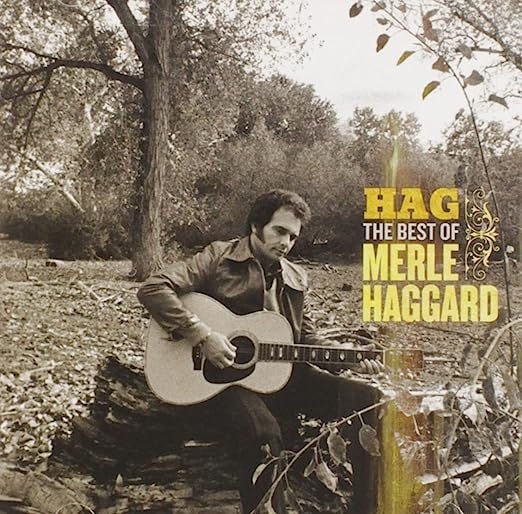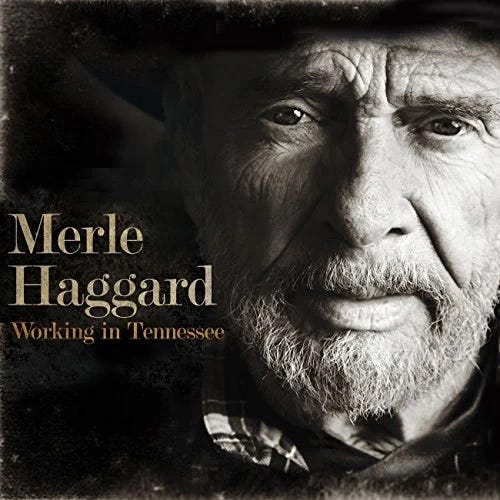Xgau Sez: July, 2023
Is there a definitive Hag compilation? What about the Rocketman? Also: jazz, comics, '70s decadence (toe fetish not included), and a few words in defense of democracy.


You have never given Merle Haggard a full A. And given the size of his catalog and the plethora of compilations by multiple labels, I’ve never dived into his catalog. So what do you play when you’re in the mood for a little Hag? Is there a compilation you find yourself returning to? Or at least a definitive one that includes his classics? — Ronan Connelly, Quintana Roo, Mexico
Before I forget, let me recommend David Cantwell’s excellent Haggard biography The Running Kind, which will probably speak to your needs better than I can. Because the fact is that I never quite grokked Haggard even though I could recognize his musical skill set, historical importance, and progressive affinities. My disconnect partly but by no means entirely reflects the time I watched him vituperatively badmouth his female stagemate at the Felt Forum circa 2006 or so, which shocked both Carola and myself so much we never forgot it. But it also reflects my personal and idiosyncratic response to his singing as opposed to songwriting, which is that there are lots of country singers I’d rather hear: Jones, Williams, Parton, Frizzell, Lynn for starters. That said, of the three rather different Haggard Capitol best-ofs on my shelves, Hag: The Best of, Vintage Collection, and The Capitol Collectors Series, I figured I’d go for the first-named, which sounded quite OK at breakfast this morning but not as masterful vocally as Lefty’s Look What Thoughts Will Do, which followed. Note too that my immediate response to your query was to think of Working in Tennessee, cut when Haggard was in his seventies and sounded it. Might be worth your time.
Have you ever found a definitive Elton John compilation? — Michaelangelo Matos, St Paul
Now that you mention it, nope. Weird for such a hit machine, isn’t it? Out of curiosity I just replayed 1975’s Rock of the Westies, which sounded all too here or there, although I liked it a lot when it first surfaced (which is how it came to pass that I wrote the Elton piece in the first Rolling Stone Illustrated History). Liked the Rocketman flick, though.
Hi Bob, I know your jazz coverage is sporadic and subjective but I’m surprised you never reviewed any albums by sax great Steve Lacy—specifically because both you and Lacy are major Thelonious Monk fans. It’s the rare Lacy album that doesn’t include a couple of Monk compositions, every one of which Lacy does something interesting with. There must be at least one or two Steve Lacy albums that make the A grade, right? — Alan, Chatsworth, California
I review more jazz than most rock critics, but these days that’s mostly to come to closer terms with my own musical history—looking back, my collegiate jazz fandom in an era when Dartmouth’s WDCR played pop only on Saturday nights, many of which I spent road-tripping to NYC, distinguish me mightily from the slightly younger cadre of folk-soaked rockcrits who graduated college circa 1966 rather than 1962 like me. So I feel no obligation to play much less review the contemporary jazz albums that randomly come my way, which is not to say I never do. I’m inclined to respect rather than love Lacy and presumably have caught him gigging once or twice, but can report no relevant musical details on his albums except that I at least A-shelved Lacy and Mal Waldron’s 1991 Hot House—that is, thought enough of it to keep to keep it in reach among my thousands of CDs. I’ll try to play it at dinner tonight and will let you know how that turns out. (Report: I wasn’t much impressed. Carola enjoyed it without much telltale kvelling.)
I know you’re not a comics fan, but have you ever read the brothers Hernandez’s work? I ask because I just finished The Brief Wondrous Life of Oscar Wao, which you’ve recommended in the past and I thought it was strongly influenced by their work. Mostly Gilbert’s Palomar stories, but there was a lot of Jamie’s Maggie and Hopey stories in it as well. It was great, by the way, so thanks. — Chuck, Upstate New York
There was a late-‘70s, pre-Nina moment when—sparked by Harvey Pekar, who we knew about via our Cleveland pal Ray Dobbins and Carola was one of the first to give national coverage—when both of us got interested in comics with the Hernandezes high on our list. I withdrew, I think, mostly because the oeuvre was so vast it was hard to get your mind around. But for sure I’d rate them artists at least as major as some contemporary novelists I’ll decline to name.
What is with your disdain for Lou Reed? Well, there’s the obvious “toefucker” comment, but your review of the album in which Lou insults you by name is less critical than some of his studio albums. The album I am referring to is Lou Reed Live: Take No Prisoners, which you gave a C+. You also gave Lou’s most incredible fuck you album of guitar feedback Metal Machine Music a C+. However, you gave Berlin, an album on which Reed at the very least tried, a C. I’m not a big Berlin apologist myself, but I think it is a rather uncontroversial opinion that it’s a better record than Metal Machine Music. Moving on, you gave Transformer, Lou’s glam rock magnum opus, a C, and hypothesized Lou had fallen from his VU-era greatness. I don’t feel I need to defend Transformer, the album is good enough and can speak for itself. Mr. Christgau, I do not know why I write you other than to ask if you still defend these beliefs? Or have you softened on Lou’s earlier records? — Zephyr F., New York City
Having awarded Reed, Velvets included, with 17 A albums, “disdain” seems like quite a stretch to me. What’s up with me as regards the “decadent” ‘70s Reed that Berlin and Transformer epitomized is that I think most rock “decadence” is asshole BS aesthetically—a cheap pass at a putatively arty “seriousness” that as a wholesome ex-Christian boy I believe romanticizes not to mention valorizes dysfunction. See the notorious Lester Bangs convos of that period, which bear out these prejudices—Reed was quite the jerk in those days. Although I liked some of his slighter ‘70s albums, and admired Metal Machine Music’s chutzpah without pretending I was itching for a replay, I didn’t warm to him again until his domestic Blue Mask/Legendary Hearts/New Sensations trilogy of the early ‘80s, although I caught a live performance of Berlin circa 2007 that I thought was OK. See “Lou Reed, Average Guy” in my Grown Up All Wrong collection for more, of which there’s plenty. And I’m sorry I didn’t squeeze the obit I wrote the day he died in front of the Bowie obit in Is It Still Good to Ya?
C’mon, you can’t expect your June answer to a question about a mentor to pass without notice. No need to argue about the worth of Carl Bernstein but your assertion that your contribution to the universe can't match the Nixon doomslayer is—what’s that word you sometimes use?—bushwa. Here’s another Xgau phrase those of us out here in the cheap seats know too well—but, OK, sure I am a fan. So how about your ownership (whatever the percentage) of the establishment of rock criticism? The recognition/celebration/validation of hip-hop as a musical force? Same for African rock/pop? Same for others I am sure I am forgetting. How about letter grades saving us from decades of insufferable, mealy-mouthed, everything-is-just-fine reviews? How about the extended career of Wussy? Nixon ended up in hell anyway. — Werner Trieschmann, Arkansas
Werner my old colleague, acquaintance, and Pazz & Jop voter, bless you. I’m proud indeed that you feel so strongly about these matters, and proud as well to have decided long ago that journalism was as likely a venue as fiction in which I might write entertaining, distinguished, mayhap even literary prose, especially since I was so bad at making shit up. I’m also proud to have transferred such values to the supposedly crude musical genre I made my journalistic lifework. But underlying both these points of pride is my belief in something deeper: democracy. And has become all too clear in the Trump years, democracy is gravely endangered. Can it be saved by journalism of the Carl Bernstein ilk alone? Of course not. But is Bernstein’s kind of fact-finding risk, luck, and labor essential to its salvation? You know it. All I can do over in my neck of the woods is bang that gong a little.


